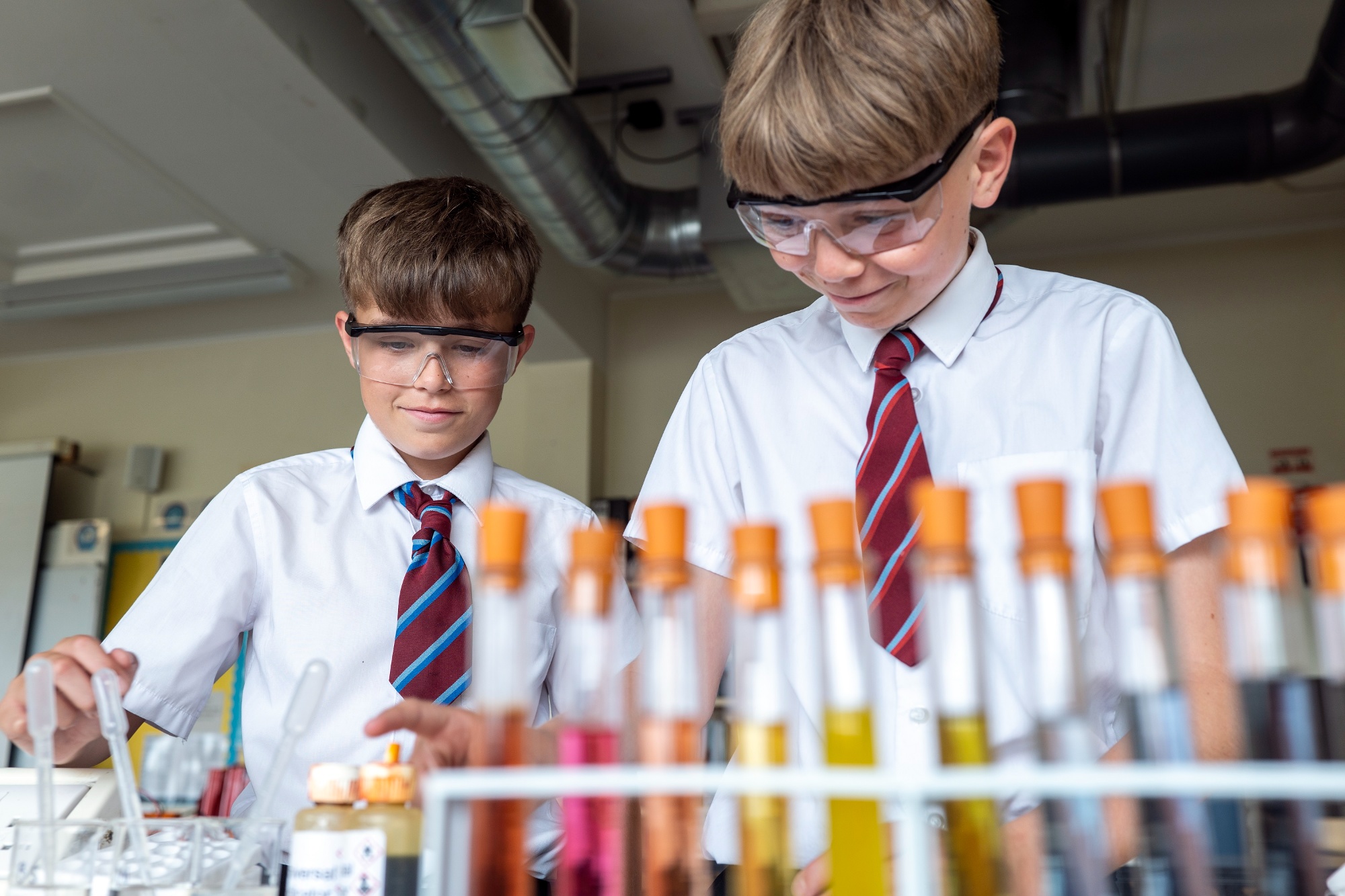Science
The vision of the Science department is to provide and deliver a curriculum that has informed sequencing with the understanding of how students learn and engage with a subject. We aim to provide a rich, broad, engaging and relevant curriculum which is led by curriculum experts.
Studying science is important because Scientific knowledge allows us to develop new technologies, solve practical problems, and make informed decisions — both individually and collectively. Because its products are so useful, the process of science is intertwined with those applications:
- Learning through experimentation
- Improved observation skills
- Enhanced academic success
- Stimulated curiosity
- Improved eye-hand coordination
- Motor skills development
- Social skill enhancement
- Boosted self-confidence
- A future within STEM

Useful Links
KS3:
- https://www.bbc.co.uk/bitesize/subjects/zng4d2p - revision website for KS3 Science
KS4:
- www.kayscience.com – useful website with biology and chemistry revision videos
- https://senecalearning.com/en-GB/ - useful revision and quiz for all science courses
- https://phet.colorado.edu/ - good science animations
- https://www.physicsandmathstutor.com/ - useful revision and past paper links for all KS4 science
KS5
- https://senecalearning.com/en-GB/ - useful revision and quiz for all science courses
- https://www.physicsandmathstutor.com/chemistry-revision/ - useful revision and past paper links for all KS5 Science
- https://isaacphysics.org/ - useful for chemistry, physics and biology
KS5 Biology websites:
- https://biologyguide.app/ - useful revision resources
- http://www.sumanasinc.com/webcontent/animation.html - good biology animations
- https://www.youtube.com/@MissEstruchBiology - Miss Estruch
- https://www.youtube.com/@Freesciencelessons/ - Free science lessons
KS5 Chemistry websites:
- RSC Practical quizzes : https://www.rsc.org/learn-chemistry/resources/online-assessment/login/index.php
- Learn Chemistry resources: http://www.rsc.org/learn-chemistry/
- A-Level Chemistry: http://www.a-levelchemistry.co.uk/
- https://www.youtube.com/user/MrERintoul/featured - YouTube channel with A level chemistry videos
- http://www.scienceskool.co.uk/a-level-exams1.html - A level chemistry exam questions
KS5 Physics websites:
- https://www.youtube.com/playlist?list=PL58rKAc12lkJZ_AEYekzyKqFtiFXPD2g8 – Crash course for physics
- https://www.youtube.com/user/minutephysics - YouTube site of interesting physics videos
Examination Courses
Key Stage 3 - Science
Science is mandatory for all students from Year 7 to Year 11.
Our approach to teaching Science in years 7-9 has been specifically designed and sequenced to engage and support the learning of our students. Incorporating all that is required of the National Curriculum but sequenced with the understanding of how students learn and engage with a subject. We aim to provide a rich, broad and relevant curriculum which is led by curriculum experts.
Key Stage 4 - Science
Science is mandatory for all students from Year 7 to Year 11.
From Years 10 to 11 students study either AQA Combined Science Trilogy or AQA Separate Sciences. Both courses cover Biology, Chemistry and Physics with Combined Science leading to two GCSE grades and Separate Science leading to three GCSE grades. The KS4 course builds upon and develops the learning from KS3 where again the fundamental topics are studied, but to a deeper level, there is also a very big emphasis on practical skills, which were developed throughout KS3 and application of knowledge. Mathematical skills and literacy skills are developed through the course. The curriculum is bespoke and with the support and guidance from the Science department, it prepares the students very well for the rigour of the GCSE examinations.
Students who follow the AQA Combined Science Trilogy course will take six 75-minute long exams at the end of Year 11. Students who follow the AQA Separate Sciences course will take six 105-minute long exams at the end of Year 11. There is no coursework in either of the courses but pupils ae expected to participate in several required practicals.
Key Stage 5 - Science
At KS5 we offer A-levels in Biology, Chemistry and Physics. All three subjects follow the AQA course and these are 100% exam based.
Biology: In A-level Biology, we further explore the processes within living organisms. The content is assessed solely via exams at the end of year 13; there are three exams in total. An endorsement of practical skills is taken alongside the A-level, which is awarded separately. These are assessed by teachers and will be based on direct observation of students’ competency across 12 practical tasks that students complete over the 2-year course.
Chemistry: At KS5 students study physical, inorganic and organic chemistry
The year 12 physical chemistry unit underpins the fundamental concepts such as atoms, compounds, molecules and equations; amount of substance; acid‐base and redox reactions; electrons, bonding and structure which goes into greater depth in year 13 with reaction rates and equilibria; pH and buffers; enthalpy, entropy and free energy; and transition elements.
The inorganic units in year 12 focus on the Periodic Table and periodicity; group 2 and group 7; along with period 3 and year 13 studying the transition metals and the reactions of ions in aqueous solution.
The organic units in year 12 looks at analytical techniques and the homogenous series alkanes, alkenes, alcohols, and haloalkanes. This goes into greater depth in year 13 where aromatic compounds, carbonyl compounds, carboxylic acids and esters, nitrogen compounds, polymers and organic synthesis are studied.
Physics: A-Level Physics is the study of the Universe around us and how it works. From quantum phenomena and subatomic particles, to stars and galaxies, and other topics in between. Using maths as a tool to describe what we find and practical work to confirm it, we can predict the motion of a tiny proton in a magnetic field, or the forces experienced by a person riding a rollercoaster, or the energy emitted by a star.


